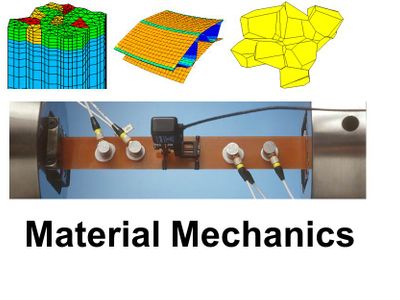The practically most important material models for mechanical calculations are presented. Consequences for finite element calculations are discussed for every material model. The properties if the material models are as well analyzed by simplified analytic methods.
SE2126 Material Mechanics 9.0 credits

Course goals and learning outcomes
- apply three dimensional material models for anisotropic elasticity, non-mechanical strains, plasticity, viscoplasticity, creep, viscoelasticity, damage development in analytic estimates and in finite element calculations.
- judge the practical applicability of the presented material models.
- understand the coupling between micro mechanical modelling and three dimensional material models.
- by use of finite element calculations or in analytic estimates be able to determine the stiffness for laminates, particle composites and materials with micro cracks and materials with periodic microstructure.
- estimate stresses and strain in inclusions.
Information per course offering
Information for Autumn 2026 Start 24 Aug 2026 programme students
- Course location
KTH Campus
- Duration
- 24 Aug 2026 - 11 Jan 2027
- Periods
Autumn 2026: P2 (4.5 hp), P1 (4.5 hp)
- Pace of study
33%
- Application code
11420
- Form of study
Normal Daytime
- Language of instruction
English
- Course memo
- Course memo is not published
- Number of places
Places are not limited
- Target group
- Elective for all Master programmes and all Master of Science in Engineering programmes from year 3 as long as it can be included in your programme.
- Planned modular schedule
- [object Object]
- Schedule
- Schedule is not published
- Part of programme
Master's Programme, Engineering Mechanics, year 2, TEMD
Master's Programme, Engineering Mechanics, year 1, TEMD
Master's Programme, Engineering Mechanics, year 1, TEMB, Mandatory
Degree Programme in Design and Product Realisation, year 4, INE
Master's Programme, Engineering Mechanics, year 1, TEMC
Master's Programme, Engineering Mechanics, year 2, TEMC
Degree Programme in Mechanical Engineering, year 4, INE, Technical profile solid mechanics
Master's Programme, Engineering Mechanics, year 1
Contact
Course syllabus as PDF
Please note: all information from the Course syllabus is available on this page in an accessible format.
Course syllabus SE2126 (Spring 2022–)Content and learning outcomes
Course contents
Intended learning outcomes
The rapid development of new materials leads to a demand for more advanced descriptions of the mechanical behavior of different materials at different length scales. Furthermore, numerical tools, such as the finite element method, also enable the use of such complicated material (constitutive) models when solving mechanical problems. The course aims to provide the student both with theoretical and practical knowledge about a large number of constitutive models relevant for a variety of different materials.
After the course the student should be able to
- apply three dimensional material models for anisotropic elasticity, non-mechanical strains, plasticity, viscoplasticity, creep, viscoelasticity, damage development in analytic estimates and in finite element calculations
- judge the practical applicability of the presented material models.
- understand the coupling between micro mechanical modelling and three dimensional material models.
- by use of finite element calculations or in analytic estimates be able to determine the stiffness for laminates, particle composites and materials with micro cracks and materials with periodic microstructure.
- estimate stresses and strain in inclusions.
Literature and preparations
Specific prerequisites
English B / English 6
SE1025 FEM for engineering applications or the equivalent.
SE1025 can be read in parallel with SE2126 during the first reading period in the autumn.
Recommended prerequisites
Basic course in Solid mechanics SE1010, SE1020, SE1021, SE1055 or an equivalent course.
Literature
Examination and completion
Grading scale
Examination
- ÖVN1 - Assignments, 1.5 credits, grading scale: P, F
- TEN2 - Examination, 4.5 credits, grading scale: A, B, C, D, E, FX, F
- LAB1 - Laboratory Work, 3.0 credits, grading scale: P, F
Based on recommendation from KTH’s coordinator for disabilities, the examiner will decide how to adapt an examination for students with documented disability.
The examiner may apply another examination format when re-examining individual students.
If the course is discontinued, students may request to be examined during the following two academic years.
Other requirements for final grade
Written exam (TEN2; 4,5 university credits)
Passed homework (ÖVN1; 1,5 university credits)
Laboratory (LAB1; 3 university credits)
Examiner
Ethical approach
- All members of a group are responsible for the group's work.
- In any assessment, every student shall honestly disclose any help received and sources used.
- In an oral assessment, every student shall be able to present and answer questions about the entire assignment and solution.